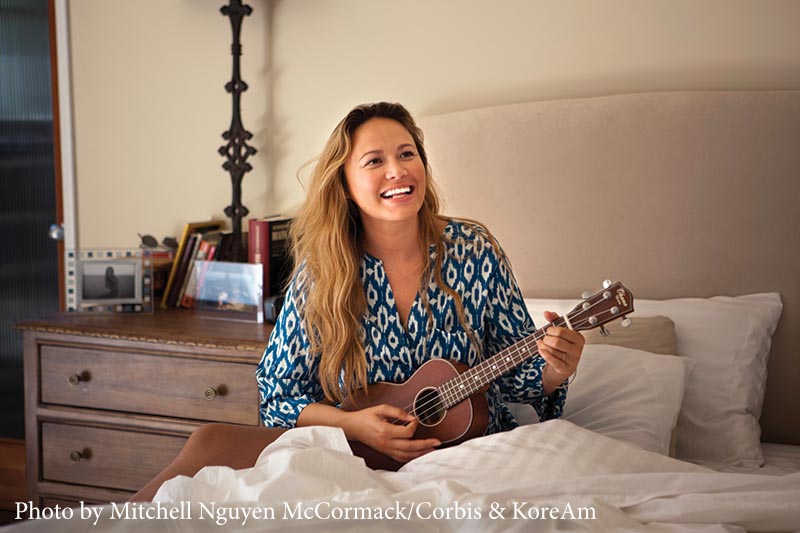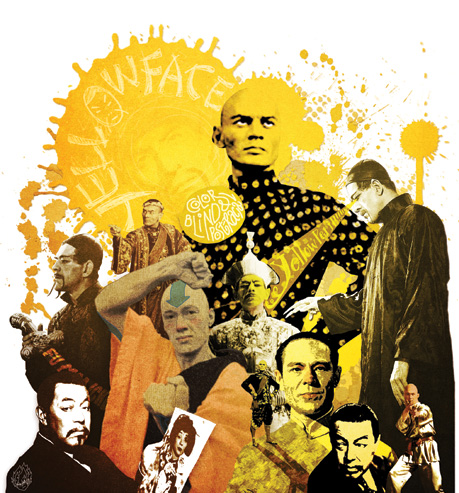Falling Skies star Moon Bloodgood welcomes KoreAm into her L.A. home. With her just-renewed series, a critically acclaimed indie film, a loving husband of one year and a baby on the way (plus her ever-proud mom always nearby), the actress shares that, at 37, she’s happier than she’s ever been.
story by OLIVER SARIA
photographs by MITCHELL NGUYEN MCCORMACK/Corbis
Moon Bloodgood’s mother Sang Cha greets me at the gate leading into the front yard of her daughter’s Venice bungalow. I’m not surprised to see her here. Five years ago, when Bloodgood last graced the cover of KoreAm, Sang Cha was present for the cover shoot, which portrayed Moon as an elegant starlet in Hollywood’s Golden Era. In that article, Moon, then in the midst of filming What Just Happened, starring Robert De Niro, was reflective about her sometimes difficult childhood in Orange County. She talked about being raised in poverty with her older sister, Caitlin, by her immigrant mother who divorced Bloodgood’s Dutch-Irish father when she was 3.
This time around, the 37-year-old actress is very much focused on the near future with a baby—her first with husband Grady Hall, whom she married last August—due in early December and a critically acclaimed film, The Sessions—in which she co-stars with Oscar-nominated/ winning actors John Hawkes, William H. Macy and Helen Hunt—set to premiere on Oct. 26. Moon—pun intended—has certainly entered a crucial phase in her life and career.
As I wait in the living room, she emerges from the back bedroom after an afternoon nap. She is five-and-a-half months pregnant, her hair is tousled, her baby bump protrudes from a loose cotton dress, she’s not wearing any makeup, and she practically glows. Her skin radiates; her sun-bleached hair casts an aura; and she exudes a yogi’s contentedness. There’s so much hormone-induced magic in the room, I could spontaneously lactate.
We exchange greetings, and she repeats my name out loud, mulling over the sound of it. “Oliver. That’s a nice name.” Sang Cha concurs, but Moon asks her mother if she can pronounce it. “We’ve been thinking about baby names,” Moon explains, “but Koreans have to be able to say it.” Evidently, the name “Oliver” doesn’t quite roll off the Korean tongue. My dream of Moon naming her child after me is quickly dashed.
For fans of TNT’s series Falling Skies—the Steven Spielberg-produced sci-fi drama about survivors rebuilding civil society after an alien apocalypse—the pregnancy is perfectly timed. In the season finale that aired last month, it was revealed that Moon’s character, Dr. Anne Glass, is pregnant. The actress asserts that this was not planned. After first hearing about the season cliffhanger, “literally I got pregnant a week later. I joke that I’m method, but I’m not.”
She’ll be pregnant during filming of the show’s third season and confirms that her pregnancy will be worked into upcoming story lines, but reveals little else. “Obviously the pregnancy is going to be written in—that I can say. But come on, it’s science fiction with aliens, use your imagination,” she says. “I’m sure there’s not going to be a simple birth with no complications.”
Career-wise, however, Moon’s pregnancy might not exactly be perfect timing (if there is such a thing.) She was slated to star in the lead role of the forthcoming film adaptation of the graphic novel Jesus Hates Zombies, starring and directed by her ex-fiancé, Eric Balfour. Moon recounts, “He called me and said, ‘I have this movie, and I want you to play the lead female because I think you’re tough and a badass, and you’re witty and you can play this tough role.’ And I was so flattered, but I got pregnant and I can’t do it.”
The role could have been ideal for her. An avid fan of horror and sci-fi films—“If you ask me, do I want to go see a romantic comedy or Prometheus, Prometheus any day of the week”—her career has naturally gravitated toward those genres, helped in no small part by her ethnically ambiguous look, which she concludes, “lends itself to the future,” and her background as a dancer, which gives her the physical dexterity to handle action roles. Her acting credits read like a fanboy’s Comic-Con panel on “Hot Women in Underappreciated Kickass Films/TV.” She starred in two short-lived, high-concept network series, Journeyman on NBC and Day Break on ABC, as well as films like Street Fighter: The Legend of Chun-Li and Terminator: Salvation.
She candidly acknowledges, though, that the opportunities (and, frankly, the desire) to play those roles are dwindling. “‘Mature’—that’s the polite way of saying you’re old. But I can’t control getting older. What am I gonna do, try to make myself look 26? And here’s the thing? Do I want to play a 26-year-old? Not really, ’cause let me say, one thing about getting older: No, you don’t look as good as you used to, but I also feel different. I don’t want to play the hot girl. I don’t want that role. My heart and my soul long to play real people that have real maturity.”
She gets the opportunity to do just that in The Sessions, which is based on the true story of writer Mark O’Brien (played by Hawkes), paralyzed from the neck down from childhood polio, who decides at age 38 to lose his virginity with the help of a sex therapist (Hunt). Moon is almost unrecognizable as Vera, O’Brien’s deadpan caretaker, a role for which director Ben Lewin hired Bloodgood on the spot. “That’s how [Ben] is. He just trusts his instincts,” she muses. “He puts me in a role I’ve never been in.”
Vera’s hair is pinned back in a tight ponytail, she wears frumpy clothes and thick-rimmed glasses. “I got the antithesis of what I’m usually cast for,” Moon proclaims. “But it was a relief for me on a personal level because I didn’t have to live up to some standard. Less was more, so that was fun. I could be subtle and I could underplay it, and it would speak volumes.” The film was one of the most buzzed-about entries at Sundance earlier this year, winning the Audience Award and Special Jury Prize for Ensemble Acting. “I got my award. It’s at my mom’s house because my mom is so cute, [she] has like a shrine and—I don’t know what order—but I think it’s John Hawkes, Helen Hunt, William H. Macy and Moon Bloodgood. Just being paired in that group just by association makes me feel really proud,” Moon beams.
She’s quick to praise her co-stars for inspiring the best out of her. “There was no posturing, there was no flexing, there was no posing. And when I say posing, I see a lot of actors pose, women and men. They pose in their scenes; they try to make themselves look better; they pout their lips. None of that,” says Moon. “These were three people (Hawkes, Macy, and Hunt) that were like, ‘I’m a real person who’s going to play a real character, and I am not going to try to make myself look better, I’m just going to be true to the character.’
“I worked with such great actors. William Macy is one of the most charismatic, sexy, interesting people you’ve ever met. You cannot imagine. He’s so interesting. And Helen Hunt, watching her in between her scenes. She had a scene with me where the camera wasn’t on her, and she fully cried tears in her eyes just to get a reaction out of me. So I get to then look good because of her because I was just responding to what she was giving me. That’s what actors mean when they say generosity. Camera’s not on them. They have nothing to gain, but they’re going to give you something so the camera then can capture your reaction.”
The role hints at a new trajectory she hopes her career could take, if she actually spent much time mapping out her career. “I deeply choose happiness and stability and a sense of normalcy in my life, and I fight narcissism because I know that’s easy to fall into when you’re an actor. So I fight any tendency toward narcissism. I try to live as normal of a life as I can. And that means not being preoccupied with my career.”
So, at a time when many actresses worry about holding on to their youth and the roles they’ve been accustomed to playing, Moon says, “I think it’s a relief knowing I’m getting older and I can just be like a character actor. I think it’s too much to try to be that ‘it’ girl. It’s too much work, and it’s too self-involved.”
If the past is any indication, whatever transition is afoot, she has an uncanny ability to have it work in her favor. She started off as a Laker Girl just before her 18th birthday and parlayed that into a career as a professional dancer and model. After her music career failed to take off, she landed a small part inWin a Date with Tad Hamilton in 2004. She has been a working actress ever since. Though she admits, “I’ve never been that confident as an actor because it wasn’t the medium I thought I was going to go into. I’m very confident as a dancer, but I’m not as an actor. I’m always amazed I continue to work.”
Similarly, marriage and motherhood have been welcome surprises. “I never planned anything in my life. Even my wedding, we planned it in a couple of months. Ten people were there.” She met her husband, a former professional baseball player turned businessman, a year-and-a-half ago in—of all things—a bowling league. “He’s not an actor. He owns an Internet company. He’s my rock. He complements me. He’s my equalizer. He’s such a gentleman,” she says. “I even gave up cursing because of him, and I gave up smoking”—a fact her mother is very grateful for. Moon, in case you’re wondering, made it very clear to her husband that she and her mother are a package deal. “I told my husband she will never go into an old-folks home. She is a part of my life.”
And, the pregnancy has only brought them closer (if that were ever possible). “I definitely want my mom to speak to my baby in Korean,” Moon asserts. “He will not say ‘grandma.’ I want him to eat the food. I want him to absolutely know my heritage and know my mom and I’m adamant about it, which probably means he’ll reject it because I’ll be so adamant about it.”
Moon actually has opted not to know the sex of the baby until he/she is born, but Sang Cha has been very clear that she not only hopes for a girl, but Moon’s clone. “Her face is beautiful, and her heart is beautiful,” Sang Cha gushes before Moon stops her mother from bragging about her anymore. Either way, Sang Cha feels like she’s won the lottery with her first grandchild on the way. “Jackpot!” she exclaims, “Jackpot, I tell her.”
The joy is apparently mutual. “I’ve never been happier,” Moon says, smiling. “I know now what happiness feels like. It feels like when you are happy, everything just looks brighter, the world just looks sunnier. I think it’s the hormones or something because I feel fantastic. I feel truly like I have purpose, and that purpose is not about me.”
She cradles her stomach. At that moment, it seems like Moon has never shone so bright.
This article was published in the September 2012 issue of KoreAm. Subscribe today! To purchase a single issue copy of the September issue, click the “Buy Now” button below.
















